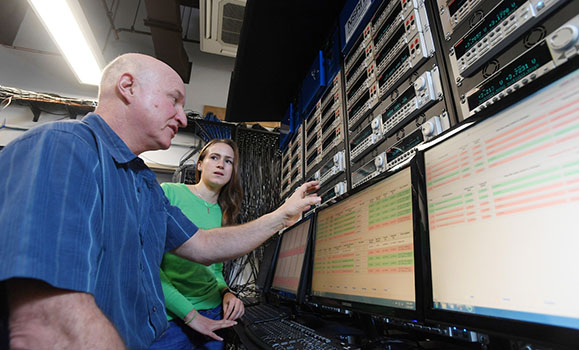Dalhousie’s Dr. Jeff Dahn has been named the 2023 recipient of the Olin Palladium Award — a top international science prize — for his pioneering work in the development of lithium-ion battery technology.
Dr. Dahn, who was surprised by news of the award earlier this month, says he is honoured to join the ranks of previous Olin Palladium recipients — a group that boasts Nobel Prize nominees and winners. The award recognizes distinguished contributions to the field of electrochemical or corrosion science.
“As this is the highest honour from the Electrochemical Society, I am humbled to be included among these famous scientists,” says Dr. Dahn, professor emeritus in the Department of Physics & Atmospheric Science and the Department of Chemistry as well as the principal investigator of the NSERC/Tesla Canada Alliance Grant.
Still going strong after more than 40 years in industry and academia, Dr. Dahn continues to be recognized for his pioneering work in the development of cutting-edge battery tech used to power cell phones, electric vehicles, and cordless tools worldwide. In 2017, he was awarded the Natural Sciences and Engineering Research Council’s Herzberg Canada Gold Medal — considered Canada’s top science prize. And then last year, he received a Killam Prize, another major national honour.
Dr. Dahn will be presented with a Palladium medal and plaque at the 244th meeting of the Electrochemical Society (ECS) meeting this October in Gothenburg, Sweden. The award is given out every two years.
Transforming lives
Dr. Alice Aiken, Dalhousie’s vice president research and innovation, was among those who supported Dr. Dahn’s candidacy for the award.
“It is not an overstatement to say that the science developed by Dr. Jeff Dahn has transformed lives around the world. His battery innovations enabled many of the technologies we use on a daily basis,” says Dr. Aiken. “But as impactful as his past research achievements have been, his current and future work promise to be just as transformative. He and his colleagues and students continue to break boundaries for battery lifetime in ways that will revolutionize how we store and consume power.”
That praise was echoed by Dr. Chuck Macdonald, dean in the Faculty of Science.
“This is a truly well-deserved recognition. Jeff Dahn has been the preeminent battery researcher in Canada for many years and his trailblazing work has already improved the lives of people worldwide,” says Dr. Macdonald. “The breakthroughs he continues to make and the phenomenal group of researchers that he trains here at Dalhousie will make the future even brighter and more sustainable.”

Chart-topping research
The Olin Palladium Award is not the only recent recognition for Dr. Dahn. This spring, he was ranked as the top scientist in Canada in the field of chemistry by Research.com, which bills itself as a leading academic platform for researchers.
To determine its rankings, the website looked at more than 15,500 scientist profiles and ranked them based on their Discipline H-index metric (D-index), which includes papers and citation values from an examined discipline. Dr. Dahn’s D-index of 147 topped the national rankings, with Dal’s Dr. Peng Zhang also represented in Canada’s top 50 chemists. Dr. Dahn placed 69th in the world rankings.
His prominence in the chemistry rankings somewhat bemuses Dr. Dahn, who does not consider himself a specialist in the discipline.
“Given that I have taken one university-level chemistry course in my life, I know there are hundreds, if not thousands, of more talented chemists than me in Canada,” he says.
Still, he admits the top billing reflects 40-plus years in the lithium-ion battery space and the more-than 90,000 citations his publications have received.
“[Lithium-ion battery research] is, and has been, a very hot area, with many researchers citing our work,” says Dr. Dahn, noting that the field encompasses many disciplines, including physics, chemistry, materials science, and chemical engineering.

